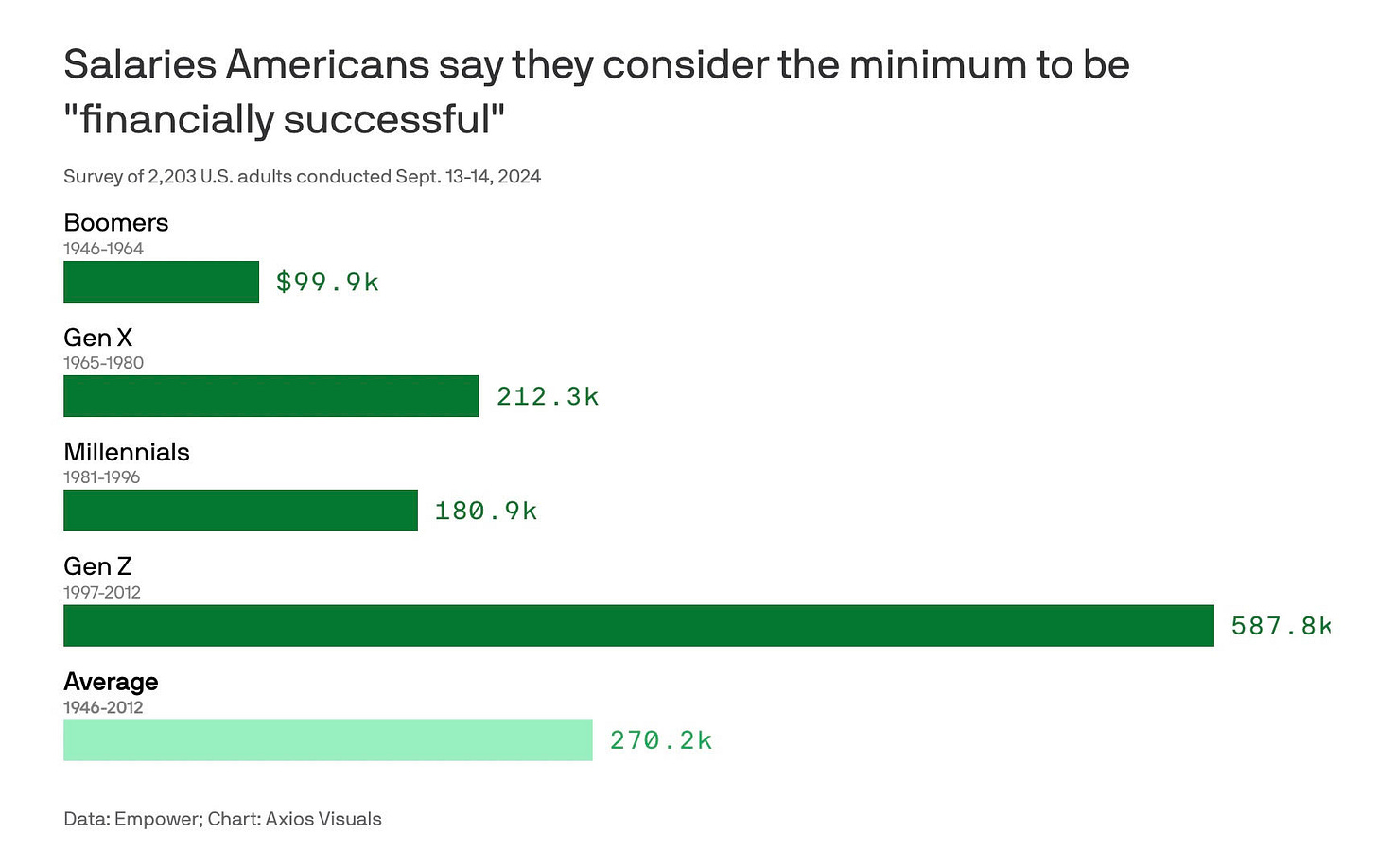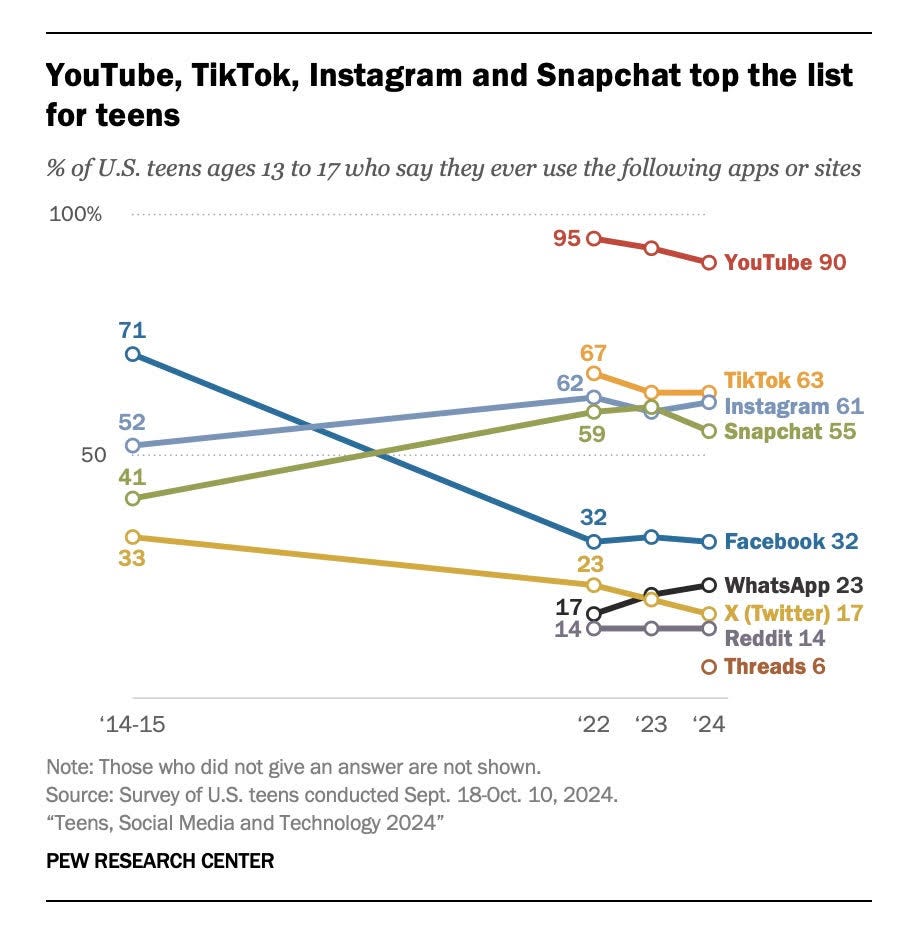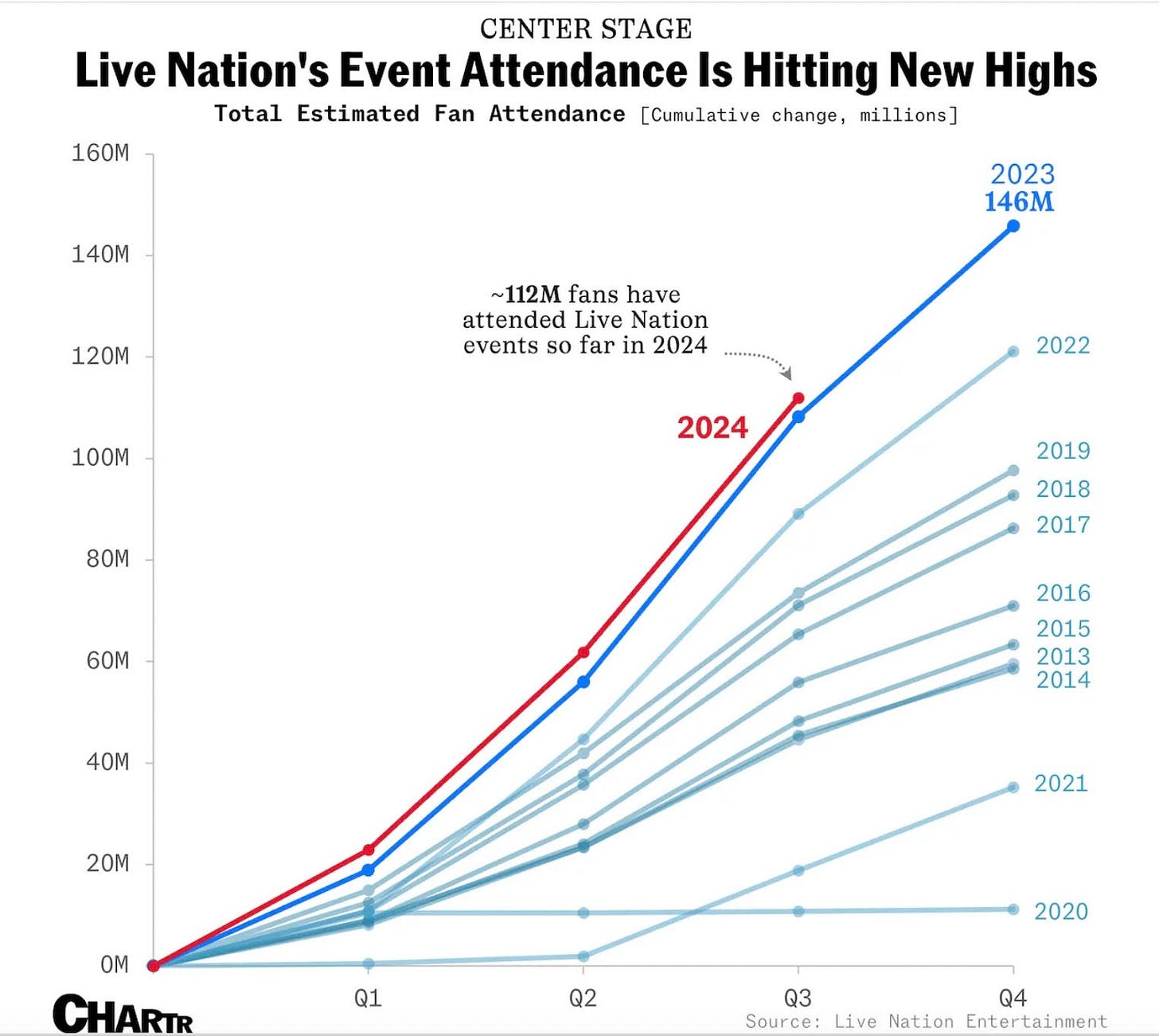Look Back and Look Ahead
2024 Trend Recap & 2025 Predictions
Happy holidays and New Year to you all! I am incredibly grateful for all of my wonderful clients and readers. Wishing for peace and joy in 2025!
Please enjoy the 2024 roundup and a glimpse of what’s next.
2024 Trend Recap
A look back at last year’s predictions
First 2024 Prediction: I predicted that Gen Z’s “treat yourself” spending would create a fixation on competitive compensation and an indifference to purpose-driven work.
I was mostly right. Compensation matters a lot, especially considering that recent data from Axios reveals that Gen Z’s definition of financial success is wild.
“Meaningfulness of work” became the last priority for young workers.
One aspect I missed was the growing importance of job security. I thought that the focus on compensation would increase the risk appetite of young workers but the unstable environment and the unknowns of AI made job security, rather than compensation, the top issue.
Second 2024 Prediction: I predicted that elite schools would untangle themselves from politics and that the popularity of Southern universities would accelerate.
Applications for freshmen admission to the University of Texas at Austin increased 24.3 percent for the Fall 2025 term. Clemson, Georgia Tech, South Carolina, and Alabama have also seen impressive upticks for 2025 enrollment. In May, Harvard announced that it will no longer be speaking out on political or social issues that don’t impact the institution’s “core function.”
Third 2024 Prediction: I predicted that Gen Z would swing right politically.
2025 Predictions: What’s Next
Accelerating trends I’m tracking in 2025
First 2025 Prediction: Religion makes a comeback.
Bible sales in America were up 22% in 2024 and cross necklaces exploded in popularity. Amy Simpson, a publisher for the Bible division of Tyndale House Publishers, told the WSJ that the surge of engagement for Bible sales comes from members of Gen Z and college students as they “want to find things that feel more solid.” US Christian teenagers are more committed to their religion than young adults.
American Jews across the generational spectrum have reported a renewed connection to Judaism and young, American Muslims continue to be the most religiously observant group of youth in the country.
Data still shows that Gen Z is overwhelmingly secular but there is fresh engagement and I could see that accelerating in 2025.
I’m reminded of David Foster Wallace’s quote, “Everyone worships something.” I think the worship of identity politics was unfulfilling and perhaps religion is filling that void.
Second 2025 Prediction: Social fitness becomes a cornerstone of work and wellbeing.
Being anxious to talk to people in real life was one of my favorite genres of Gen Z humor during the pandemic, like this TikTok video of the popular influencer, Chris, attempting to act normal around a Postmates delivery person.
2025 could be the year that we double down on social fitness, which refers to an individual’s ability to effectively navigate, engage in, and maintain healthy interpersonal relationships and social interactions.
Dating apps are tanking in popularity with Gen Z as they seek to meet in more organic, romantic ways. Gen Z is the group that most wants to work in-person. There is also some interesting data showing that teen social media use has gone down ever so slightly since 2022 while spending on real life experiences is up.
People want to feel enchanted.
The previous version of wellbeing became synonymous with things like optimized sleep, sober-curiosity, expensive supplements, and disciplined workouts. None of these things are bad but a critical component was overlooked: Fun. There are some serious unintended consequences when everyone is asleep and sober. In the face of loneliness, a focus on social fitness may make a bigger play in the youth-driven wellness industry and encourage workers to spend more time in-person.
Third 2025 Prediction: Excellence will matter more than effort.
The parenting books I read 5 years ago advised me to emphasis effort, not achievement if I wanted my kids to grow up with grit and tenacity. Instead of saying “you’re a great reader,” parents were encouraged to say “I see how hard you’re working at reading.” The idea was that if parents and teachers emphasized and incentivized effort, not necessarily outcome, children would cultivate growth mindsets. Although it makes sense, there have been some unintended consequences that people aren’t thrilled with so we’re reversing course. We’re going back to excellence, people.
Parenting advice and school curriculum became centered on effort and grit nearly ten years ago. The idea, like most ideas about children, had good intentions and continues to have applicability. But this past year I heard many stories from front line managers about young workers who wanted recognition and accolades for trying hard, even if their effort didn’t result in great work.
In a recent op-ed for NYT, organizational psychologist Adam Grant shares similar experiences he has had with students. He writes:
“Teachers and parents owe kids a more balanced message. There’s a reason we award Olympic medals to the athletes who swim the fastest, not the ones who train the hardest. What counts is not sheer effort but the progress and performance that result.”
I have long said that modern technology creates a scenario where leaders have to focus more on what gets done and obsess less on how it gets done. Praising effort, rather than excellence, emphasizes the how, but not the what. How hard did you try? How much time did you dedicate? But the reality is, putting time into something doesn’t matter if the output is mediocre. And because of AI, the time people spend on many tasks will diminish.
The messaging to huge swaths of young people was that effort, in and of itself, matters most. Young people may face growing pains as the workplace changes course to emphasize excellence over the effort they have become accustomed to being praised for.
Fourth 2025 Prediction: Optimism moves back into favor.
Nihilism and disillusionment were hallmarks of recent youth culture but I think 2025 will mark the end of that movement. The ethos of the next era seems more rooted in optimism, courage, and dynamism. I don’t have data or charts for you on this, but it’s a feeling that I (and many others) have.
My last three predictions all lead us to this vibe shift. As people seek out more meaning and connection (spirituality, religion, social fitness), and more excellence, they can’t help but feel less disillusioned.
Work
2024 was a whirlwind. I delivered 60 keynote speeches, began a research fellowship role at Filene, exhaustedly followed the generational aspects of the election, and collaborated with phenomenal writers and researchers. I am truly grateful for everyone I’ve been able to work with over the year.
/Life
2024 also marked a lot of celebrations in my personal life. My little sister and my best friend from college both got married. My husband turned 40. My oldest daughter started 1st grade and my little one went off to pre-k.
This coming summer we’re taking our most ambitious family trip yet—a weeklong excursion through The Grand Tetons and Yellowstone National Park. When I told my 5-year-old what we had in store, she immediately started sobbing and said “I HATE BUGS.” So, we’ll see how it goes.
I finally finished Walter Isaacson’s biography of Albert Einstein. It took me the entire year because it turns out that I did not understand the theory of relativity. I loved this book and I am left inspired by the story of a flawed man who tried his best to use his otherworldly talents as a source for good. A quote of his that I keep going back to: “Life is like riding a bicycle. To keep your balance, you must keep moving.”







LOL at the "I hate bugs" -- I'm with you, kiddo!